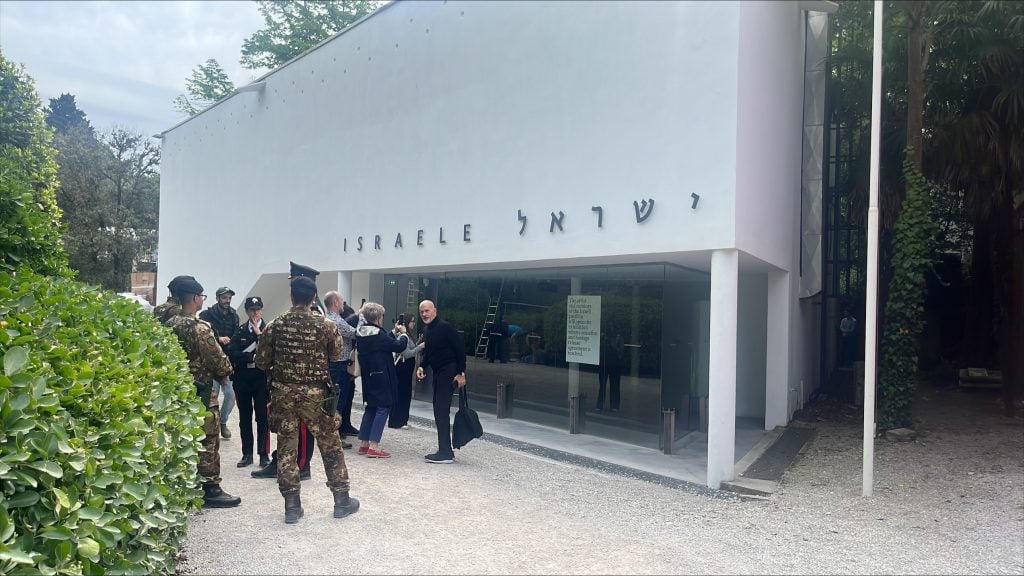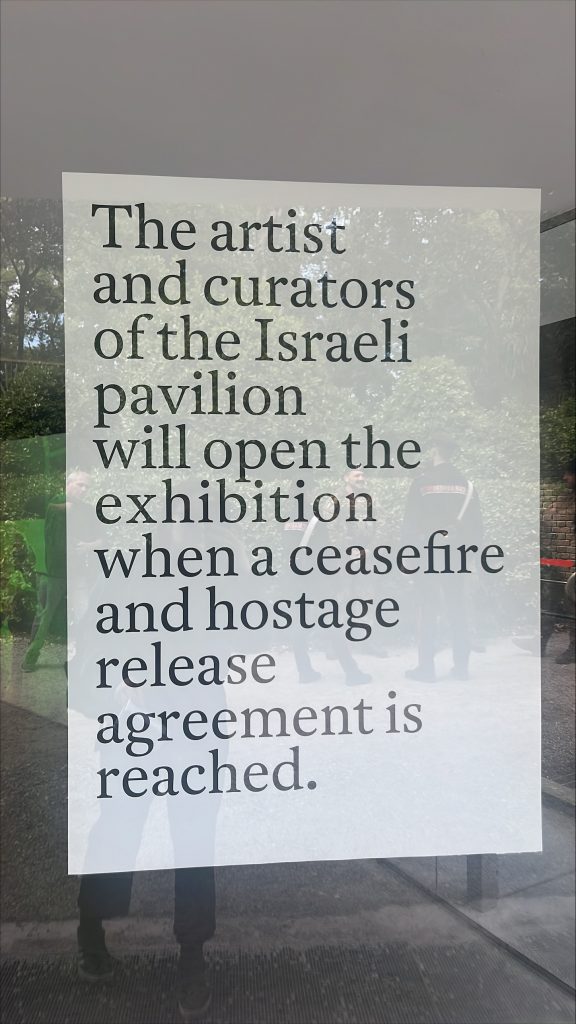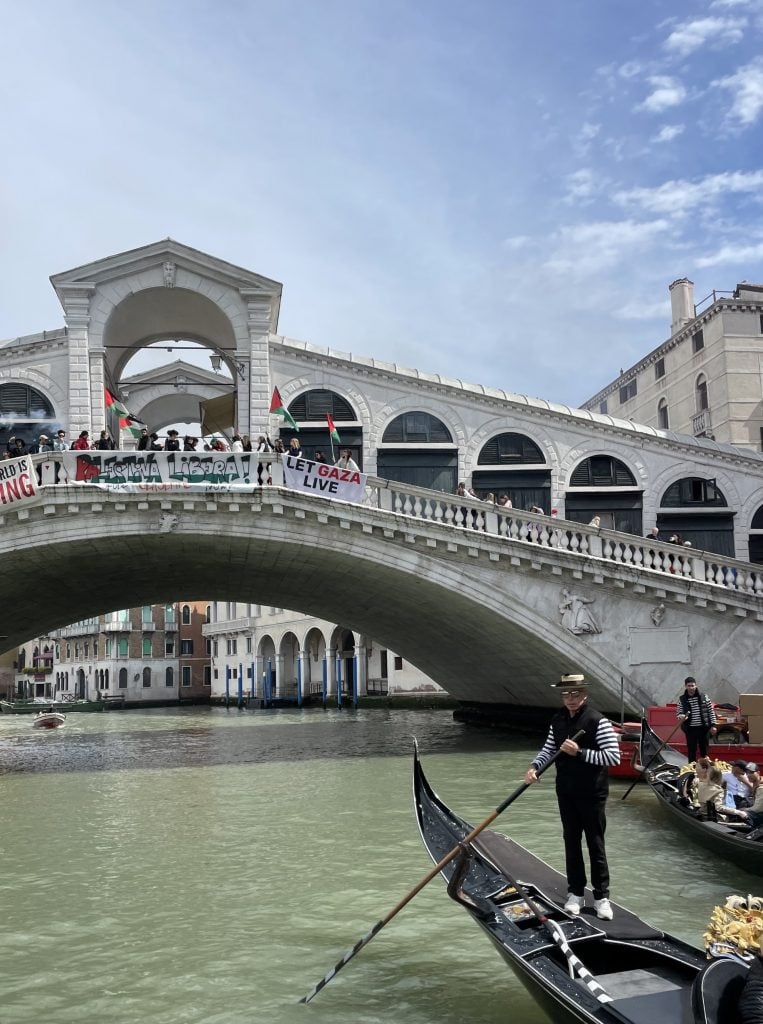Art World
Israel Will Not Participate in the 2025 Venice Architecture Biennale, Prompting Criticism
Commentators questioned why long-awaited renovations have suddenly become urgent.

Commentators questioned why long-awaited renovations have suddenly become urgent.

Jo Lawson-Tancred

Israel has decided not to take part in the 19th Venice Architecture Biennale next year, with officials at the ministry of culture allegedly claiming that they need to renovate Israel’s pavilion.
The news was first reported by Haaretz, one of Israel’s leading newspapers, which noted that this is the first time Israel has opted to withdraw from a major international event since the war on Gaza began in October. It claimed that the decision has not been well received, “sparking criticism that Israel was staying away at a time when the country’s artists and academics were already being boycotted abroad.”
Israel’s ministry of culture and the Biennale did not respond to a request for comment by press time.
The pavilion, which was designed by Zeev Rechter and inaugurated in 1952, has long been in need to renovations, according to Haaretz. The architect’s son has been lobbying the culture ministry to carry out these works for the past 15 years, according to an ex-official from the ministry, Idit Amihai, who is now the director of the Institute for Israeli Art.
She added: “This year of all years they have to renovate and decide not to participate by choice? It would be one thing if we weren’t invited. Now when we’re being ostracized is precisely the time for us to take part.”

A closure notice from artist Ruth Patir and exhibition curators hangs in the window of the Israel Pavilion at the Venice Biennale. Photo: Jo Lawson Tancred.
The newspaper cited “budget constraints imposed by the war” and the fact that the culture ministry “started looking too late” as reasons that Israel would not be hosting an exhibition in an alternative venue.
Israeli media has been critical of the decision. The Jerusalem Post said: “This failure to represent Israel in a world-class event spells another low point for the current administration.”
Israel’s participation in this year’s 60th Venice Biennale art exhibition this year caused considerable controversy in the run up to its vernissage week in April. In February, an pro-Palestine activist group called the Art Not Genocide Alliance (ANGA) started a petition calling for Israel’s exclusion, which to date has received over 24,000 signatures from members of the international art community. It noted that apartheid South African had been banned from participating between 1968 and 1993, and claimed that “any official representation of Israel on the international cultural stage is an endorsement of its policies and of the genocide in Gaza.”
Eventually, Italy’s culture minister Gennaro Sangiuliano dismissed the possibility of barring Israel from the event. “My deepest solidarity and closeness goes to the State of Israel, its artists, and all its citizens,” he said.
Artist Ruth Patir, who is representing Israel at the Biennale, made a shock announcement on the first preview day of the event that she would keep her exhibition at the pavilion closed to the public until “a cease-fire and hostage release agreement is reached.” She issued a statement on Instagram stating: “I firmly object to a cultural boycott, but since I feel there are no right answers, and I can only do what I can with the space I have, I prefer to raise my voice with those I stand with in their scream, ceasefire now, bring the people back from captivity.”

Protestors on the Rialto Bridge. Photo: Margaret Carrigan.
Demonstrations organized by ANGA took place as planned outside the Israel pavilion and on Rialto Bridge the following day, April 17, further criticizing the pavilion and Patir’s closure of it.
“ANGA does not applaud empty and opportunistic gestures timed for maximum press coverage, and leaving video works on view to the public, while Palestinians are killed by Israel every hour and millions face imminent famine,” it said.
ANGA was reached for comment on Israel’s decision to withdraw from next year’s architecture biennial but did not respond by publication time.
Palestine does not have a pavilion at the Venice Biennale because Italy does not recognize it as a sovereign state. Palestinian art is the focus of the official collateral event “South West Bank: Landworks, Collective Action and Sound” at Palazzo Contarini Polignac and of “Foreigners in their Homeland,” and unofficial collateral event organized by the Palestine Museum U.S. at Palazzo Mora.
In the Israel-Gaza conflict that has raged since October, the latest figures say over 37,000 Palestinians have been killed, including more than 15,000 children; 1,139 Israelis were killed during the October 7 attacks by Hamas.
Since the war broke out, protests, boycotts, cancelations, and withdrawals have been made at major events and venues in the art world. Other major cultural events have also faced protests against Israel’s participation in recent months. The Eurovision Song Contest in May provoked considerable backlash, including protests and boycotts. In the U.K., viewership fell by almost a quarter compared to 2023, according to the Guardian. In February 2022, the European Broadcasting Union excluded Russia from participating in that year’s contest due to its invasion of Ukraine.